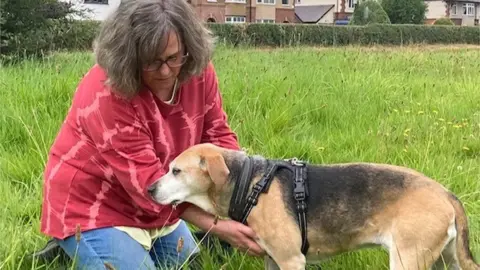Pet dementia: 85% of cases in dogs and cats undiagnosed, say vets
Staffie-cross Poppy was a lively family dog until her owner started to notice gradual changes in her behaviour.
Poppy, then aged 14, would stand and stare into space, wake and pace around at night and would get stuck behind the furniture.
Her worried owner Jacqui Bassett took her to her local vet - who confirmed a diagnosis of dog dementia.
Now a group of vets has called for more awareness of pet dementia, claiming 85% of cases go undiagnosed.

Vets4Pets said greater awareness was needed about the condition in both dogs and cats, because treatment is more effective in the early stages.
According to the group, one in four elderly dogs and one in three cats will develop dementia.
An online tool has been launched to help pet owners check for signs of dementia in animals aged seven or more.
For Poppy, a diagnosis meant her owners could understand her behaviour and help her through a treatment programme.
"She's on a medication from the vet to help slow things down, but also we know how to support her, we are patient, we take time with her," said Ms Bassett, who lives in Wrexham.
 Jacqui Bassett
Jacqui Bassett"We understand that she's not understanding - and we are able to help her more."
Dr Huw Stacey, an animal behaviourist and director of clinical services at Vets4Pets, said it is not always something that can be picked up at a pet's yearly health check, because of the "slow onset" of the condition.
"They're the kind of behaviour changes that people can very easily attribute to just getting older," said Dr Stacey.
"So if they're looking a bit disorientated or having accidents in the house, or they're up and restless at night, people think it's just part of getting old and there's nothing that can be done."
He added early diagnosis could improve the outcome for pets, slowing down the progress of the condition.
"Dietary manipulation's really powerful in this in terms of improving animals' nutrition to help their brain function," he said.
"Changes to the environment and the ways that you as a pet owner interact with your pets can make life easier for them as well."
'Heartbreaking'
By making small adjustments, Poppy's family have been helping her to enjoy a contented life, in spite of her dementia.
"I hope and I think that she's still happy most of the time," said Ms Bassett.
 Jacqui Bassett
Jacqui Bassett"It is heartbreaking when they get old anyway, but to have this added... they are not the dog they used to be.
"As long as she's having a quality of life, enjoying her sniffs, she's eating and drinking... everything's OK.
"Because we work so closely with our vet, she will help us decide when the time is to say goodbye."

- MOTHERS, MISSILES AND THE AMERICAN PRESIDENT: The story of Greenham told like never before
- FIERCE AND FABULOUS: Hayley Goes... exploring the issues of her generation in a brand new series

